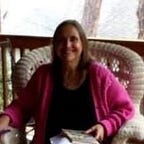The Problem with Banning Books
In the 1990s, when I still had small children at home, I went to a writer’s conference where an author presented an in-depth workshop on writing for children. Inspired and wanting to experience more, I went to the library to check out some of her books.
Every single one of them dealt with young girls exploring lesbian behaviors. (She hadn’t mentioned that at the conference.)
My gut reaction was, I don’t want my girls to read these books. I’d rather they didn’t know anything about this.
Flash even further back, to the 1960s. I had my first period when I was 10. No one prepared me for it. I thought I had a horrible disease. When I showed my mom my bloody underwear, she said, “Already? Oh, honey, this is just a part of growing up. This is going to happen every month now.” No further explanation. (My mother had her first period at age 16. She was staying with relatives at the time. She was also not prepared. When she confided in her aunt, she was told, “Well, you must have done something bad.” It was the 1930s.)
When I was 11, my Girl Scout troop leaders wanted to show us a movie about menstruation, and they sent a letter to our parents about it. My mother wanted me to see it. I had no idea what it was about. But the principal of our Catholic school (a nun) got wind of it and called all the members of our troop into her office and told us not to see it. She said she wanted us to stay little girls as long as we could. She didn’t know that I already had my period and didn’t know why. I think she was afraid we’d hear something about s-e-x and wanted to protect us from it. When I told my mother what Sister said, she told me I was no longer going to see the movie.
Two years later, a friend found out how the sperm gets to the egg. (All we knew about where babies came from was that a man has a sperm and a woman has an egg, and when they get together, a baby is conceived. We knew nothing about the mechanics.) She told a group of us that “the boy puts his you-know-what you-know-where.” It took us a while to figure out what you-know-what was and where you-know-where was, but when we figured it out, we were adamant we would never ever let that happen. That’s probably a good position for an eighth grader to take.
It’s hard for a child to grow up in this day and age with explicit content everywhere and not know the facts of life until age 13. I don’t know whether that’s a good thing or a bad thing. Surely parents have the right to withhold information from their children that they believe they’re not ready to process. But do they have the right to withhold it from everyone’s children? And do they have the right to suppress other information, like the role slavery and racism have played in United States’ history, or how colonists annihilated hundreds of thousands of the original residents of the western hemisphere?
When I was a child, I read voraciously. When I had read virtually every book in the children’s room of our town library multiple times, I graduated to the adult area. As a preteen, I read murder mysteries, historical romances, and science books. I found answers to questions my parents were reluctant to talk about. Many times I read passages that shocked me with their sexuality, violence, or depravity. I never told my parents what I was reading because they would have forbidden me to read it. Yet, I never acted out what I read.
If anything, my reading educated me, entertained me, prepared me, and helped me to recognize when I was in a situation that could turn dangerous for me.
From the perspective of my advanced years, I believe that for every book, there is a person who needs to read it. There may be books that the average person really doesn’t need to (or shouldn’t) read, like how to make an atomic bomb at home or how to kill someone and make it look like an accident (if those books actually exist), but that’s not necessarily what’s being banned. If you look at a list of commonly banned books, you may very well see books you’ve read yourself and enjoyed and would be mystified that anyone could object to. Often, the bans are supported by people who have never read the books and don’t even know what they’re about-they’re not interested because someone else already said they’re bad. What if you were going through a crisis, like being confused about your gender, or dealing with an incarcerated parent, or finding drugs in your child’s bedroom, and you couldn’t get your hands on appropriate literature because someone else found it objectionable?
As many as a million books are published each year in the United States. That should be cause for rejoicing. Let’s not limit people’s access to them.
Originally published at http://arhtisticlicense.com on May 23, 2023.
